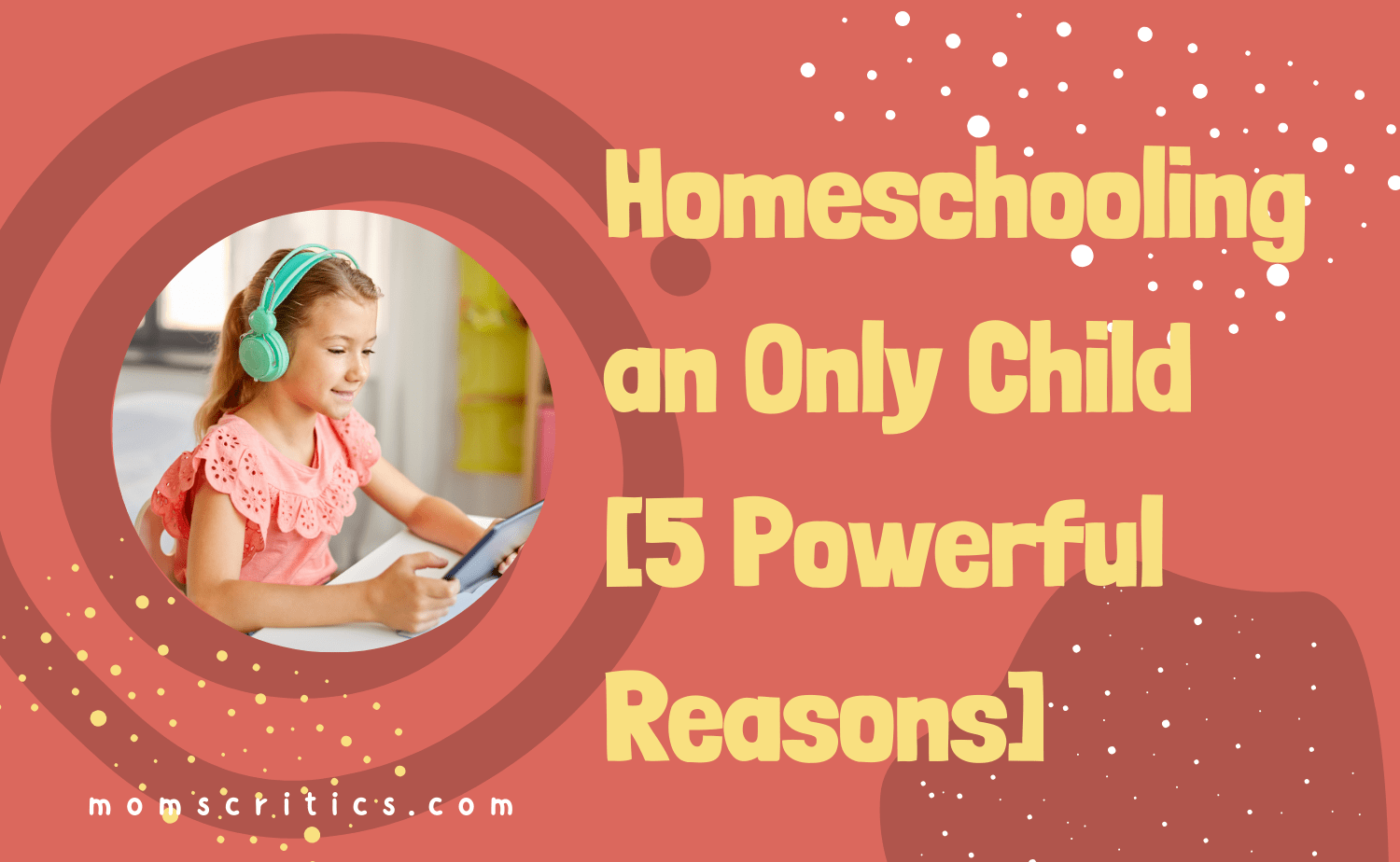Homeschooling/self-directed learning has been deemed an ideal solution to give kids the most excellent education without leaving the homeschooling environment for any reason.
Even small villages can provide a lot of resources for kids. Homeschooling an only kid is a fantastic experience.
Fortunately, only children may receive an excellent education at home with homeschooling, eliminating the need for them to leave the house.
I believe many resources are available if you’re considering giving your child this option, even in small places.

5 reasons why homeschooling an only child is a great decision
There are distinct advantages and difficulties associated with being the only child. I’ve compiled a list of my top recommendations for homeschooling an only kid if you’re a new homeschooling parent or feel a little isolated in this endeavor.
You can customize your curriculum completely!
The plan for your families homeschooling each day may be tailored to your child’s needs, even down to the curriculum. It is up to you whether you sleep in or out. You have the option to spend more time with older kids at home or be constantly on the road.
You could go anywhere, or spend a little more at home. You can go further and study topics you are passionate about. This allows you all of the flexibility on how you teach a family homeschooling program for a single school year.
Academic subjects typically need far less time than they would in a traditional classroom, which is another benefit of tailoring instruction for your kid.
This gives you lots of free time to pursue your passions, spend quality time with your family, and get better relaxation and sleep.

Homeschooling an only child offers personalized learning
Being able to assist your only child with every facet of schooling is unmatched, from mental health to life skills to schooling to handling challenging relationships.
Although home education is still very successful, it has not yet been standardized to a high standard compared to public schools.
When compared to public school, large-family homeschooling still offers an excellent teacher-to-student ratio. Still, nothing compares to the one-on-one time that only homeschooling provides for kids.
Part of your family’s homeschooling adventure is figuring out how you and your kid collaborate as homeschoolers.
Kids may be divided into three main categories, in my opinion. You should not be concerned if it takes some time to discover just one child with the best learning style because there are many learning styles (kinesthetic, visual, and oral) among several kids in each camp.
You might also like to read: Habits of Highly Successful Homeschoolers

Homeschooling an only child gives a lot of social opportunities
There are many myths about homeschooling, however socialization is a major one. Socializing issues are often misunderstood even among homeschooling families with many kids.
Homeschooling an only child doesn’t mean they won’t be successful socially. Socialising will always be a problem even when other issues arise in parenting with no connection to homeschooling. I can’t stress this enough: socializing isn’t an issue unless there are deeper parenting problems that are related to homeschooling.
Essentially, the issue lies in the fact that socialization is now defined as spending six to eight hours a day, five days a week, in a public school classroom with twenty peers of the same age. Forced association is not socialization, as is a common statement in the child homeschool community.
Kids may develop healthy social skills by connecting with a diverse range of others across all age groups and contexts, including online classes, play dates, cooperative work, everyday life, homeschooling, other homeschool families together, interest groups (e.g., a homeschool group), sports, field trips, religious communities, extracurricular activities, grocery shopping, and being a nice neighbor.
An added benefit for businesses is that older children may take on part-time or, full-time jobs and yet have plenty of time to finish their schooling. They also have considerably more schedule freedom. Employment is a fantastic way to develop social skills, independence, responsibility, and interaction with a variety of others.
A child’s education, family culture, and safety shouldn’t be sacrificed in the name of social interactions. However, the time, work, and convenience they will cost you as a homeschool mom will be well worth the investment!
I implore you to put aside your concerns about socializing if you’re thinking about homeschooling or are reading this because you know someone who does and you’re worried about them. To help an only child acquire good social skills, all they need is a small network of close friends with other kids (especially their older siblings and best friends), some real-world community participation, and everyday living.
Read Also: Starting A Homeschool Coop

Homeschooling an only child allows you to focus on strengths
Homeschooling an only child can offer different types of education to the child – a focus not offered at an institution like a private school or traditional school. You can select an approach that is rooted in your strengths.
When children are in grades as they grow, they cannot learn or get a lot of help, they may also need additional assistance. Furthermore, it emphasizes the slower-developing skill set as well as academics.
We are different from each other as adults. But when it comes time to go from first grade to middle school to college, the focus must become your weakness.
When you homeschool, you may concentrate on your strengths and let your flaws surface as a result of your progress.
Indeed, it is how things do happen in the homeschool journey. Learning becomes a pleasant journey rather than an arduous uphill struggle for children whose bodies and minds are developmentally mature.
Homeschooling an only child takes less time
If only one is in the classroom things are moving quickly enough. You don’t need to teach more than one child.
There’s no distraction from your work, this speeds up the process.
It’ll help make homeschooling easier. It gives your kid time to do things they like based on interest-led learning, to acquire information and skills, it also enables the child to explore their particular interests.
Advantages of homeschooling an only child
There are obstacles to overcome while homeschooling an only child. I believe that there are just a few major advantages to homeschooling other parents with multiple kids.
- Individualized attention: homeschooling allows parents to tailor the curriculum and teaching methods to suit the unique learning style and pace of their only child.
- Strong parent-child bond: spending more time together during homeschooling strengthens the parent-child relationship and creates a closer bond. You will comprehend each other better as you discover your comfort zones in your homeschooling life. Mutual respect and knowledge of one another’s learning preferences, requirements, and styles will serve as the foundation for the regulations.
- Flexibility: it provides flexibility in scheduling, allowing the child to pursue interests and activities outside of traditional school hours.
- Personalized learning: it enables homeschool moms to focus on their child’s strengths and weaknesses, providing targeted support and encouragement.
- Reduced social pressure: being an only child can sometimes lead to feelings of loneliness or social pressure in a public school system. Homeschooling can provide a more relaxed and supportive environment for the child to develop socially at their own pace.
- Tailored social opportunities: homeschooled-only children can still have opportunities for socialization through extracurricular activities, community events, and play dates with other children.
- Increased self-confidence: it allows the child to progress academically at their own pace, which can boost their self-esteem and confidence in their abilities.
- Safe learning environment: it provides a safe and nurturing environment for an only child to learn without the distractions or negative influences that may be present in a traditional school setting.
- Better education than a private school: all of your education funding will go toward one child, saving you from dividing it among siblings. Your only child will have a richer education that year than most if you can afford one sport, two special interest classes every season, and a few field trips.

Disadvantages of homeschooling an only child
Homeschooling is indeed difficult. Any size family that chooses to homeschool will have particular challenges. It also exudes happiness!
A homeschooling family with an only child may encounter the following particular challenges:
- Limited social interaction: homeschooling an only child may limit their opportunities for socializing with peers and developing social skills.
But there are easy ways to solve it. I have a detailed walkthrough on how homeschoolers make friends, and I recommend you to check it.
- Lack of diversity: homeschooling can sometimes limit exposure to different cultures, backgrounds, and perspectives that a public school setting may provide.
- Parental burnout: homeschooling can be a demanding and time-consuming task, especially when done for an only child. This may lead to parental burnout and strain on the parent-child relationship.
- Limited extracurricular opportunities: homeschooling an only child may limit their access to extracurricular activities, sports, clubs, and other opportunities for personal growth and development.
- Academic pressure: being the sole focus of the parent-teacher may create additional academic pressure on the only child, leading to stress and anxiety about performance.
- Limited independence: homeschooling an only child may limit their opportunities to develop independence and autonomy, as they may rely heavily on their parents for guidance and instruction.
How do we fix only-child syndrome?
I suggest the following on how a single parent improves social skills and social abilities.
- Ensure dialogue.
- Let it be fun. Share responsibilities.
- Avoid interference.
- Establish clear limits.
- Keep things real.
- Do not expect perfection.
FAQs
Is it a good idea to homeschool an only child?
It ultimately depends on the individual needs and circumstances of the child and their parents.
How does being an only child affect development?
Being an only child can have both positive and negative effects on development, depending on school age and the individual child’s circumstances and experiences.
What is the happiest family size?
There is no one-size-fits-all answer to what the happiest family size is, as happiness in a family can be influenced by a variety of factors beyond just the number of children.
Family dynamics, relationships between family members making friends, individual personalities, parenting styles, and external circumstances all play a role in determining overall family happiness.
Are homeschooled kids happier?
There is no definitive answer to whether homeschooled kids are happier than their traditionally schooled counterparts, as happiness is a subjective and complex emotion that can be influenced by a variety of factors.
Any resources/support groups for homeschool families?
Online forums, social media groups, local homeschooling associations, and instructional websites are just a few of the many tools accessible to parents who want to educate their only child.
These platforms may offer support, guidance, and a feeling of community.
Can homeschooling balance academic rigor with personal growth?
Incorporating projects, field trips, and hands-on activities into the curriculum, establishing realistic objectives, offering chances for creativity and discovery, and fostering a love of lifelong learning are ways parents may help their kids achieve a balance between academic rigor and personal growth.
Conclusion
Over the past few years, homeschooling has been on the rise. Part of your family’s homeschooling journey is figuring out how your child and other homeschooled children can collaborate effectively.
Homeschooling an only child can present both opportunities and difficulties.
It might result in restrictions on social contact with other kids, exposure to diversity, and extracurricular activities.
When deciding whether to homeschool an only child, it’s important to take into account the child’s unique requirements, interests, and the resources that can help them learn and grow.
I hope this piece has enlightened you on all you need to know as parents.
More Related Guides
Do You Save Money Homeschooling? Facts and Figures
Good Laptops for Homeschooling Students: 9 Unique Choices in 2024
Is Homeschooling Hard? - Let's Discover The Facts
How to Pass a Multiple Choice Test - 12 Tips

Alex is a passionate writer who shares his thoughts with strong facts and evidence. His research skill is amazing allowing him to write on life tips and development advice that the readers pursue.


